6 scenarios that prove consent doesn’t have to be complicated
Reading Time: 3 minutes These cartoon strips put consent in our everyday lives into perspective.
Reading Time: 3 minutes These cartoon strips put consent in our everyday lives into perspective.
Reading Time: 6 minutes Understanding the connection between alcohol and sexual assault can help us foster stronger, more respectful communities.
Reading Time: 9 minutes Learn strategies for practicing consent, self-empowerment, and boundary setting.
Reading Time: 10 minutes Studies of sexual assault consistently show a higher rate of victimization of people with disabilities compared to nondisabled people. The good news? You can get involved.
Reading Time: 13 minutes Is campus safety improving in terms of sexual assault? How can you talk to your partner about sex in a healthy, nonjudgmental way? Our sexual literacy experts answer these and other important questions.
Reading Time: 8 minutes When it comes to sexual encounters, we should strive not just for consent but enthusiastic consent. Learn the difference and why it’s worth holding out.
Rate this article and enter to win
What makes a romantic or sexual encounter great? What do people want out of hookups? Everyone has their own answers—like physical pleasure, feeling connected to their partner, or developing a relationship. One quality, though, is fundamental to all good encounters: mutual desire.
So how can you make your sexual experiences more like your fantasies?
“Unsexy sex” refers to sexual encounters in which one or both partners are in it for unsexy reasons—such as a sense of obligation, an urge to fit in, or a need to prove something. Good sex is based in genuine desire—the difference between a reluctant yes and an exuberant yes!
In a sexual or romantic encounter, talking or expressing desire doesn’t ruin the mood. Just the opposite—this can bring about some of the sexiest moments. These five steps will help you communicate in ways that deepen the pleasure or connection for you and your partner.
 |
Trust your body language |
Why body language works
One of the most important things about communication is how basic it is. As two-year-olds, most of us learn to interpret agreement, refusal, and ambiguity. And we only get better at it over time. We’re very good at interpreting—and giving—signs. These may be in words, tone of voice, or body language.
What does that have to do with romance and sex? If you think you’re making it clear with your body, tone, or words that you do or don’t want something, the person you’re talking to or hooking up with can almost certainly tell.
Humans are highly skilled at understanding acceptance and rejection in sexual and non-sexual contexts, according to researchers. “There are indeed miscommunications in sexual activity (as in all of life), and those miscommunications can certainly get in the way of fulfilling, pleasurable experiences. But they do not cause rape or assault,” says Dr. Melanie Boyd, assistant dean in student affairs at Yale University.
Clarifying affirmative consent
Sometimes, people dismiss the idea of communicating about the different parts of a physical encounter as a series of awkward questions: “May I put my hand on your leg? What about on your belly?” But this denies how we communicate during sex. The vast majority of people pick up on and respond to their partners’ signals. And when people ask outright, it only opens partners up to talk about what they want. This is far from a series of clinical questions or doctor’s checklist.
So trust your body language—and think about how to use it to express what you want. Your might place your partner’s hand where you want to be touched. You might create more space between your bodies and take a moment to talk. You might get closer and talk a little less.
All communication skills can be impaired by alcohol and other substances. If you are unsure whether or not the other person (or you) is able to give consent, call a halt. Mutually enthusiastic sex can be rescheduled.
Some people have genuine difficulty interpreting nonverbal language and social cues. This has implications for establishing mutual sexual consent.
What to say to your partner if understanding body language is hard for you
“I don’t always pick up on body language, so if I misunderstand you, it’s not intentional. Please tell me directly what you want and what you don’t want.”
What to say to your partner if understanding body language is hard for them
“Let’s be direct, so we’re sure to understand each other. I’ll tell you what I want and what I don’t want. What do you want?”
How misunderstandings can happen
“This is mainly about the ability to read other people’s intentions and thoughts,” says Dr. Isabelle Hénault, a sexologist and psychologist based in Montreal, Quebec. “Especially with individuals with Asperger syndrome or other autism conditions, they rarely act out with a negative intention. Any problems are most likely about misreading situations.”
+ Why consent is like a cup of tea
How to communicate clearly
When one or both people have difficulty interpreting body language and other nonverbal cues, “be very concrete, very explicit, very clear,” says Michael Glenn, a clinical social worker and sex educator based in Massachusetts. He recommends disclosing a relevant diagnosis. “I really believe that at this point in time, enough is known about Asperger’s. You may as well label it and discuss it more openly, and make it sound interesting.”
How to develop sexual communication skills
For people who struggle with interpreting social cues, intimate communication skills are best learned with support from a clinician, says Glenn: “They really need a professional who they can talk to in an ongoing way.” Therapists and their clients use role-playing and scripting to build skills. Pornography does not represent social norms or rules, and should not be used as a guide.
+ Seek support from Adult Services at the Asperger/Autism Network [AANE]
 |
Talk about your desires (& theirs) |
Express your desire
Expressing desire is about showing your own enthusiasm—and it’s about shaping a hookup or encounter for the better. Whether you’re looking for pleasure, a feeling of connectedness, or something else, communication is essential. Expressing your own desire helps your partner understand what you’re looking for, and it’s a chance to talk or figure out together what you each want.
In a recent poll by Student Health 101, more than half the respondents (53 percent) said that what makes them feel most desired is their partner telling them “I care about you” or “I desire you.”
Ask what they want
Talking is key, whether you’re going for physical pleasure, trying new things, feeling connected, empowered, or sexy, or something else. “Furthering the conversation in a positive way is fun,” Twanna A. Hines, the sex writer behind the Funky Brown Chick blog and Twitter account, told Student Health 101. Try questions like these, she says: “What are you into? What’s the hottest thing you’ve ever tried?”
Enthusiastic consent
Sometimes this shared excitement is called enthusiastic consent. This is the idea that when people engage in sexual activity, it’s not simply that you both agree to do it—it is something you both actively want. Focusing on your partner’s enthusiasm and finding where your desires overlap makes any encounter better.
“The ideal is a genuinely mutual, engaged, connected encounter that’s working for both people,” says Dr. Melanie Boyd, who runs programming designed to create a more positive sexual and romantic culture at Yale University.
 |
Listen, don’t assume |
Listening is always better than assuming
Discussing your desires can feel intimidating. But remember—you are not a mind reader and neither is your partner. Every person comes into a sexual encounter with different goals and experiences. To get to shared desire and enthusiasm, it’s important to be attentive to your partner.
“Hooking up with someone from another country, you know there might be differences you don’t expect, so it’ll be important to communicate well,” says Dr. Melanie Boyd, assistant dean in student affairs at Yale University. “That’s likely to also be true of people whose values and experiences you think you already know.”
When it makes sense to be wary—and when it doesn’t
Listen to your partner. As you signal that you’re open to learning about their desires and what feels good to them, they should respond in kind. If they don’t—pay attention to that. And if your partner stops responding, check in and make sure they’re still OK with this. Remember: quality, not quantity.
Don’t worry about seeming inexperienced or wide-eyed. This kind of open communication will make an encounter more pleasurable, more mutual, more connected.
Talk about the basics ahead of time
Assumptions about what your partner might want are just as likely to prevent mutual engagement and pleasure. And while much communication around desire happens through body language, often things like whether to have sex, or how to do it, need to be talked through. Before you begin a sexual encounter, discuss consent, contraception, and sexually transmitted infections, says sex writer Twanna A. Hines. These conversations can help put people at ease.
To treat your partner as you would want to be treated, go into an encounter trying to understand what they’re looking for and how they want to get there.
 |
Know what you want |
Know what you’re looking for
Thinking about what you want out of an encounter or relationship, and about how you express desire, can help you feel clearer and more confident to pursue what you want.
“The research shows that so many young people are dissatisfied with their sex lives because they don’t understand it’s about quality, not quantity,” Jaclyn Friedman, an activist and a survivor of sexual assault, told Student Health 101. “Let go of the idea that sex is an accomplishment, something to collect, a commodity that we trade in, something one person gives up and the other person gets.”
Prioritize two-way communication
It’s important to look for partners with whom you can communicate in ways that work for both of you. Just as you’ll want to signal that you’re open to hearing what their desires are, you should look for partners who make you feel you can share and discuss your desires with them.
People who don’t seem to pay attention to what you want, who disregard your feelings, are unlikely to be ideal partners. And if you can find someone who values pleasure, mutuality, and emotional connection in ways that you do, or make you think about how you value those things—even if it’s only a one-time thing—then you’re on your way to creating more ideal encounters.
“Unsexy sex” refers to sexual experiences that are consensual but not pleasurable or enthusiastic for everyone involved. The term comes from Dr. Nicola Gavey, professor of psychology at the University of Auckland, who researches the ways that cultural norms influence sexual behavior.
 |
Take the pressure off: Dos & don’ts |
Know what sounds like pressure
In discussing with a partner what you want out of an encounter, it’s important that you don’t pressure them. After all, an ideal encounter is marked by mutual desire and enthusiasm.
Discuss the ground rules
Discuss ground rules: what you want to try, what you don’t want to try, what you might want to try, and maybe safe words as well. (See below.) “Asking open-ended questions—‘How do we have a lot of fun?’—communicates boundaries and seeks to provide pleasure for both parties,” says Twanna A. Hines of the Funky Brown Chick blog.
If you or they want to “give up control”
Exploring sexual roles involving dominance and submission, to whatever degree, plays on the idea that someone has given up control over their own body and desire. That idea is part of the game, but is not the reality. This kind of sexual encounter again relies on mutual agreement, clear expectations and boundaries, and safe words that signal when someone needs to stop or do something differently. Explicit communication and earned trust are essential. (A safe word is a word or phrase you would never otherwise use during sex; for example, “glitter bomb”. You agree in advance that it means “Stop right now and check in”.)
Don’t say |
Do say |
Tell me if anything I do makes you uncomfortable… |
|
I’m going to… |
|
Time for us to… |
|
How students talk about consent
How has a partner (or past partners) let you know they want to have sex or hook up?
What does “enthusiastic consent” mean to you?
Source: Student Health 101 survey, December 2015
Sexual empowerment webinars & info: Amy Jo Goddard
What You Really Really Want: The Smart Girl’s Shame–Free Guide to Sex and Safety: Jaclyn Friedman
Seal Press, 2011
Be the change you want to see: Reid Mihalko
Brochures on sexual culture: Yale University
Find local sexual assault services and other resources: NotAlone.gov
Support with consent skills (contact Adult Services): Asperger/Autism Network [AANE]
Rate this article and enter to win
At an early age, we learn the ability to discern agreement and refusal—like in preschool, when you noticed that touching Jamie’s hair made Jamie pull away, even before your teacher told you to ask permission before doing something with another person’s body or property. Sexual consent is about those same communication skills. Essentially, it’s the same rule as always: Before you touch somebody’s body or property, ask first. Whatever their response, accept it.

Affirmative consent means that sexual interactions are held to the same standard as most other exchanges. Just as you can’t enter someone’s home or take someone’s stuff unless they’ve said it’s OK, you can’t engage in any form of sexual activity with someone unless they’ve said it’s OK. Consent is never implied and can never be assumed. It can be revoked at any time.
Why are there affirmative consent laws and policies?
The shift toward an alternative consent standard recognizes that the absence of a verbal “no” doesn’t mean consent, just like not fighting back against a mugger doesn’t mean your wallet was a gift to them. Affirmative consent requires a “yes”. Romantic and sexual relationships are about mutuality. Everyone involved should be enthusiastic and engaged.
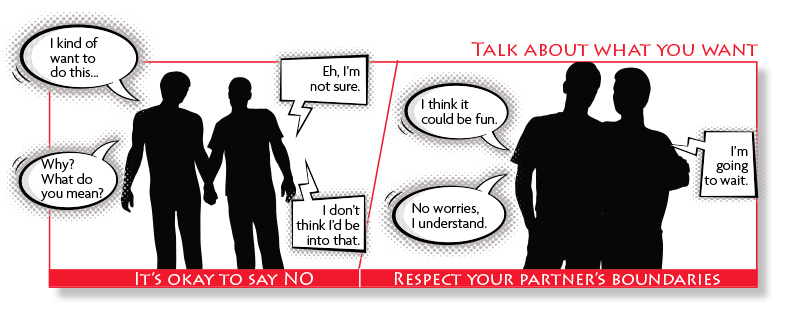
Consent is critical—and it’s not complicated
We can tell when someone is agreeing enthusiastically or grudgingly, or refusing altogether. Our communicative skills work just as well in sexual situations. Unambiguous, positive responses are especially easy to affirm.
What if the cues you’re getting indicate discomfort, lack of interest, or confusion?
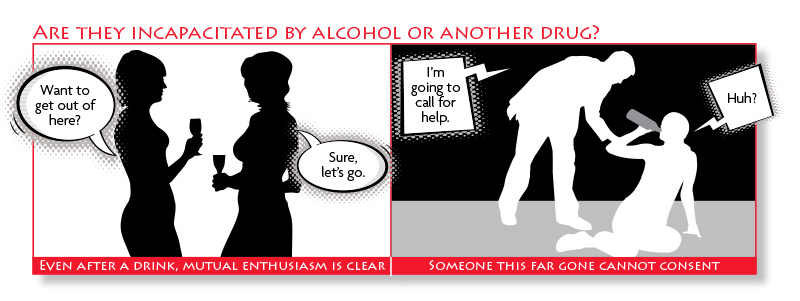
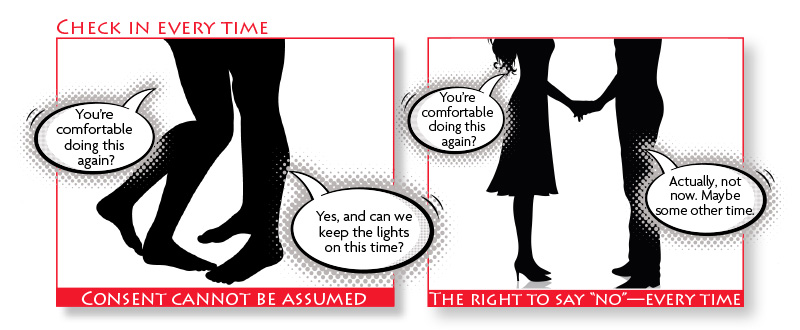
What we all need to know
What we know
Harassment is persistently bothering or threatening people and interfering with their ability to live their lives.
Repeatedly directing sexual attention to someone who has not consented to it (e.g., pestering them for sex or a date, repeatedly calling or texting them with sexual solicitations or insults, sending unsolicited nude pictures) is harassment.
This is never consensual and it’s never OK.
If you or someone you know is experiencing harassment, reach out for help. Your school’s Title IX Coordinator can offer you support and point you toward other resources.
Stalking is focusing attention on a person or group in a threatening or fear-inducing way.
This is never consensual and it’s never OK.
If you or someone you know is experiencing stalking, reach out for help. Your school’s Title IX Coordinator can offer you support and point you toward other resources.
Coercion is making someone fear negative consequences if they don’t do what you want.
Note: You might worry that a person won’t like you if you don’t have sex. This is not in itself coercion: People are entitled not to like you. It becomes coercive if a person indicates that there will be negative consequences if you don’t have sex.
If you or someone you know is experiencing coercion, reach out for help. Your school’s Title IX Coordinator can offer you support and point you toward other resources.
Check your assumptions.
Appearance is no indication of availability for sex.
Sexual aggressors use their victims’ appearance in an attempt to justify their aggression. This is never OK.
Check your assumptions. Previous choices are no indication of availability for sex. In any case, rumors are often false, and may be spread and used by sexual aggressors.
Sexual aggressors use their victims’ sexual histories in an attempt to justify their aggression. This is never OK.
Check your assumptions. No type of work, including any role relating to the sex industry, indicates availability for sex.
Sex work isn’t an enforceable contract. No matter what someone does for a living, no one has the right to have sex with them without their consent.
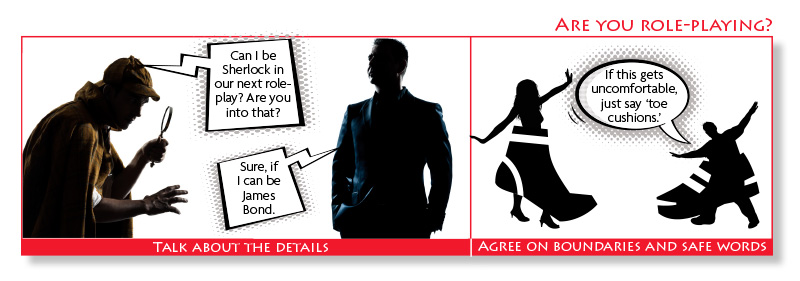
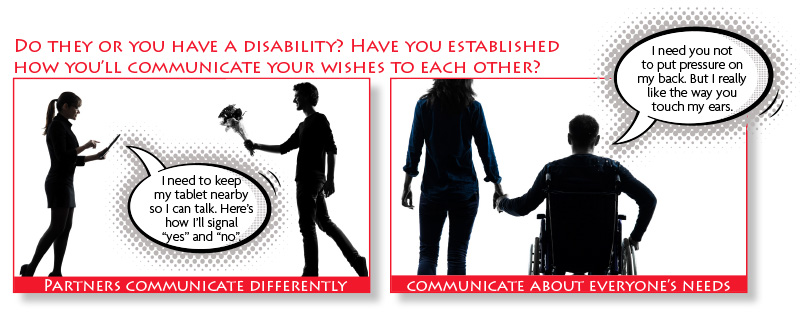
Get help or find out more